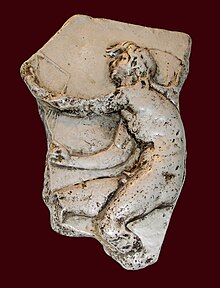This article needs additional citations for verification. (July 2024) |


Kairos (Ancient Greek: καιρός) is an ancient Greek word meaning 'the right or critical moment'.[1] In modern Greek, kairos also means 'weather' or 'time'.
It is one of two words that the ancient Greeks had for 'time'; the other being chronos (χρόνος). Whereas the latter refers to chronological or sequential time,[2] kairos signifies a good or proper time for action. In this sense, while chronos is quantitative, kairos has a qualitative, permanent nature.[3]
The plural, kairoi (καιροί) means 'the times'. Kairos is a term, idea, and practice that has been applied in several fields including classical rhetoric, modern rhetoric, digital media, Christian theology, and science.
- ^ Liddell and Scott, Greek-English Lexicon.
- ^ Liddel, George; Scott, Robert. "A Greek-English Lexicon". www.perseus.tufts.edu. Archived from the original on 30 October 2022. Retrieved 30 October 2022. Definition 2, in particular, references chronological time - dates and years. For example, the reference to Thucydides translates to "but he is somewhat concise and not accurate in his dates." Where "in his dates" is "τοῖς χρόνοις."
- ^ "(Dictionary Entry)". Henry George Liddell, Robert Scott, A Greek-English Lexicon. Retrieved 2015-07-13.